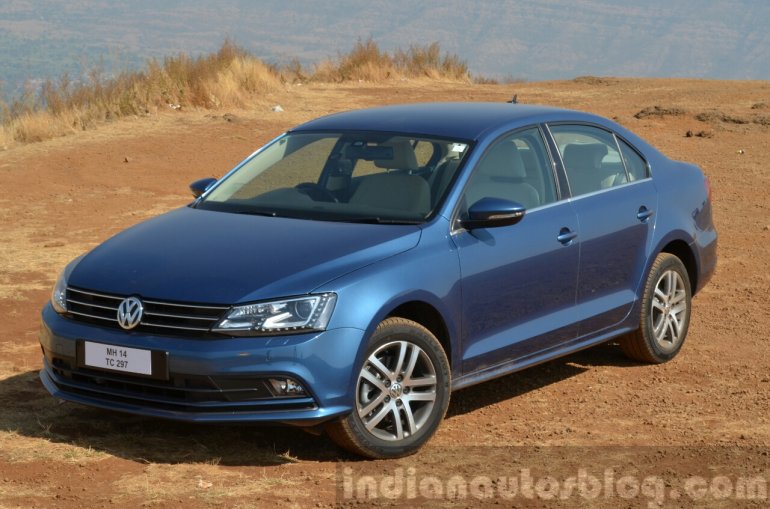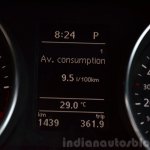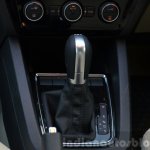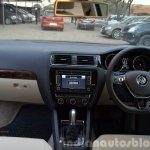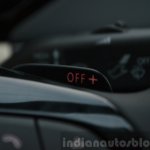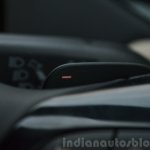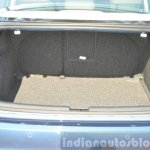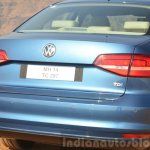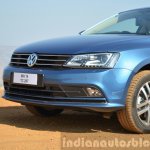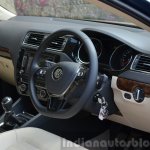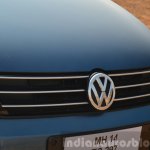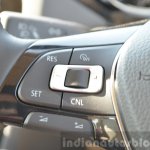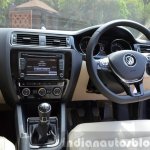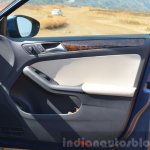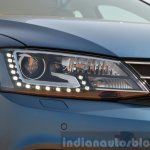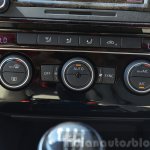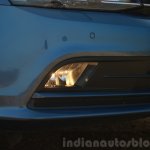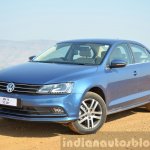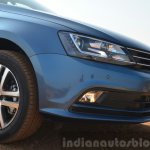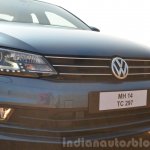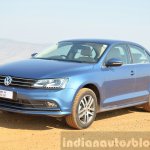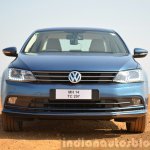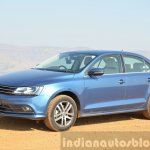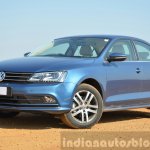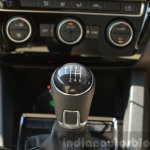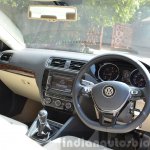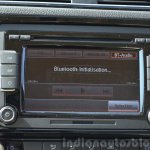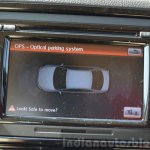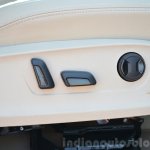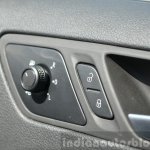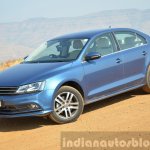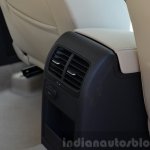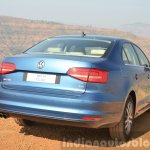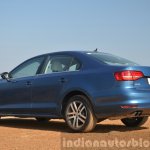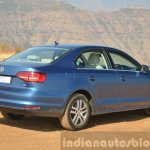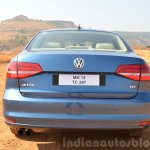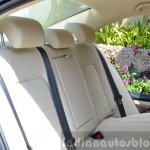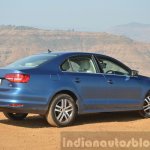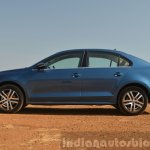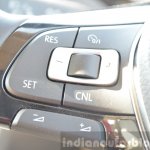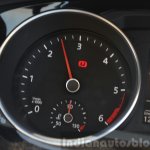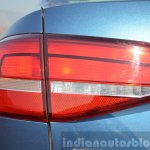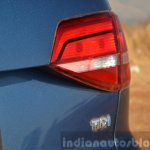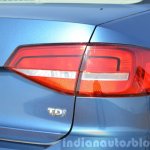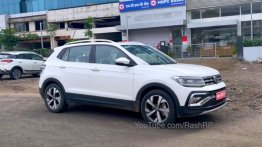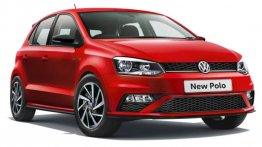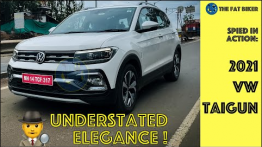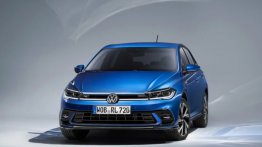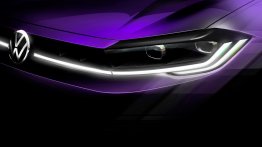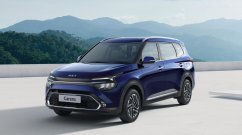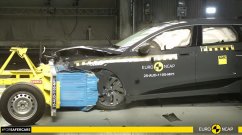Speaking at the Indian launch of the 2015 VW Jetta (facelift), Mr. Michael Mayer, Director, Volkswagen Passenger Cars, Volkswagen Group Sales India Pvt. Ltd., said that cars like the Jetta continue to have a dedicated (a small, but dedicated nevertheless) fan following, which would rather buy a sedan over an SUV.
And it is exactly for this audience that VW India has brought the Jetta facelift, which was first shown at last year’s New York Auto Show. Minor cosmetic and feature changes aside, there are no mechanical improvements to the Jetta facelift. Here’s what it is like to drive -
Exterior:
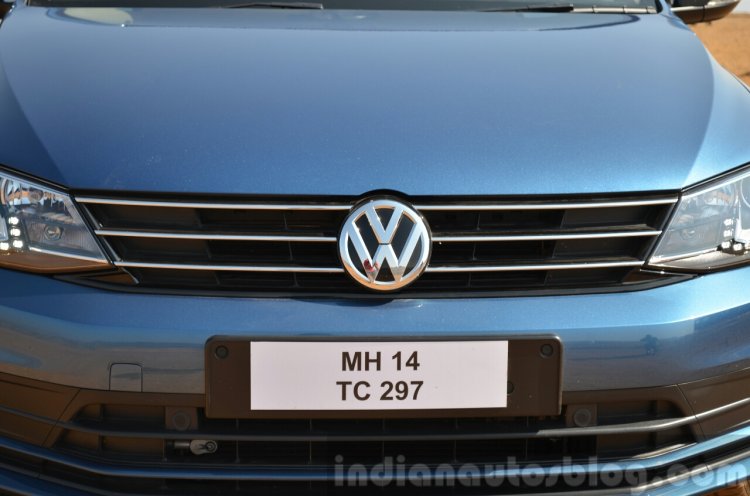
The Jetta facelift sports a new triple-slat chrome grille, a new front bumper with redesigned foglight enclosures, redesigned taillights and the addition of a new Blue body color. There are no other changes to the sedan's body.
Top-end variants are offered with Bi-Xenon headlights and LED daytime running lights, whereas entry- and mid-level variants do with halogen lights for the headlamps and daytime running lights.
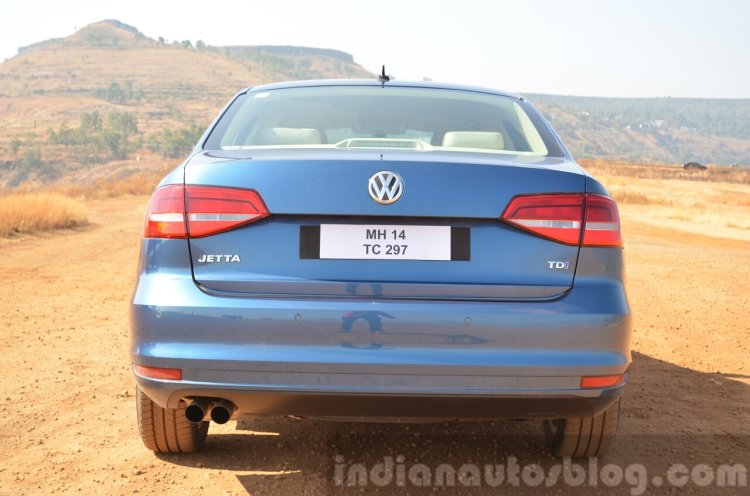
To look at, the Jetta facelift is more polished than its predecessor despite minor cosmetic changes. VW’s mid-life facelift programs have always focused on subtle changes, and they certainly have done a fine job with the Jetta.
Interior:
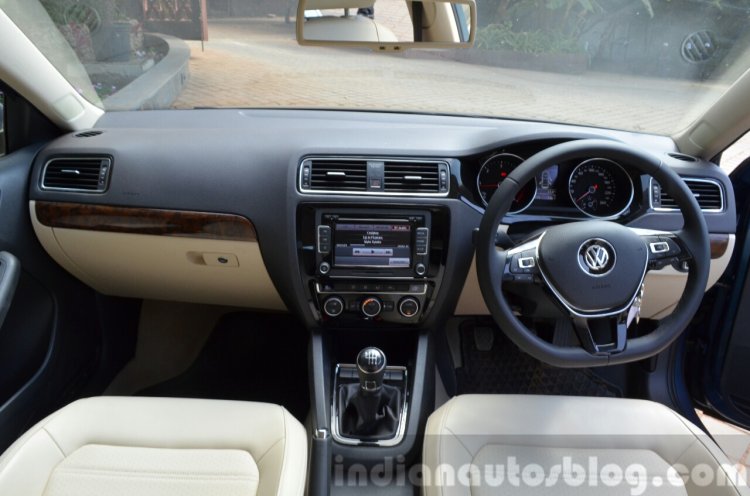
The most significant change inside is the three-spoke flat-bottomed steering wheel. VW is making this steering unit a standard feature on all its cars (in India and abroad), and to hold and actually use, the new unit feels a step above the pre-facelift.
The Jetta facelift also gets a new twin-tube instrument cluster, which is again an aesthetic improvement over the pre-facelift model’s slightly mundane cluster.
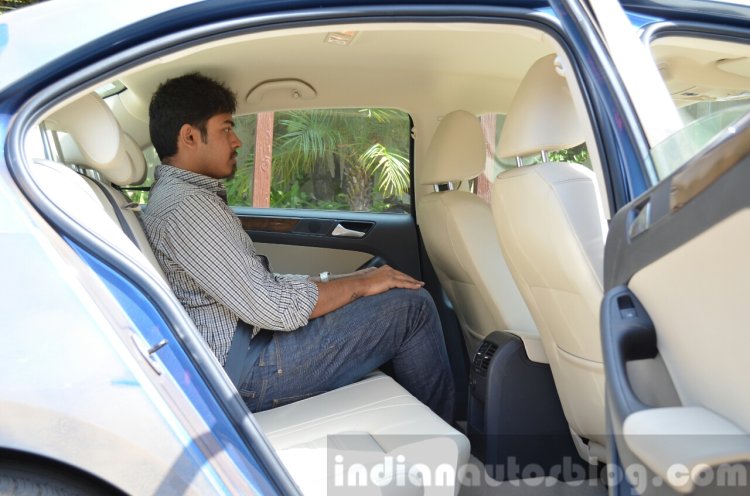
Quality speaks for itself, and while VW’s bread-and-butter models like the Vento and Polo have superior build quality, in the Jetta, this is taken to a league above. A simple action of adding beige to the lower half of the dashboard, and the faux-wood trim over the glovebox endow the cabin with a luxury feel.
The rear bench is extremely comfortable on all fronts, though its placed low to the ground and the window line a bit high, for our liking.
Features:
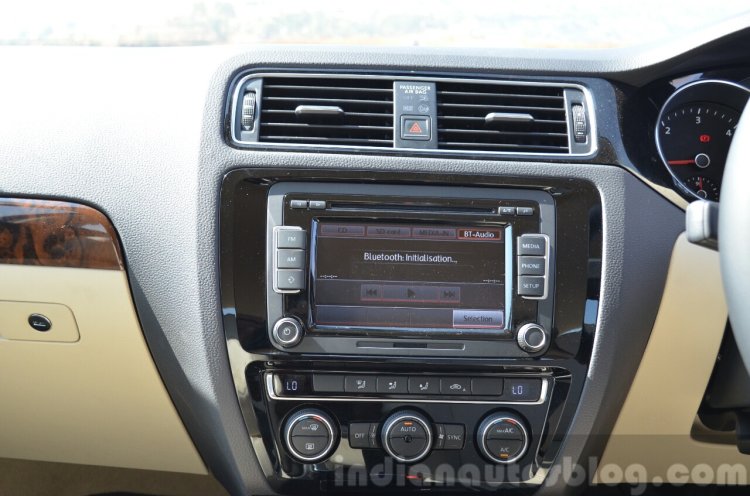
All variants of the new Jetta will come with cruise control as standard. A Fatigue detection system, which analyses steering inputs, and prompts the driver to take a break is also provided, the ‘Coffee’ logo bearing an uncanny resemblance to Mercedes’s Attention Assist system.
ABS, EBD, ESP and 6 airbags are part of the standard equipment. VW has in the past been stingy on offering features on the Jetta (for eg, the base variants did without climate control), but on the Jetta facelift, the news does get better. All variants get dual-zone climate control, a chilled glovebox and rear AC vents.
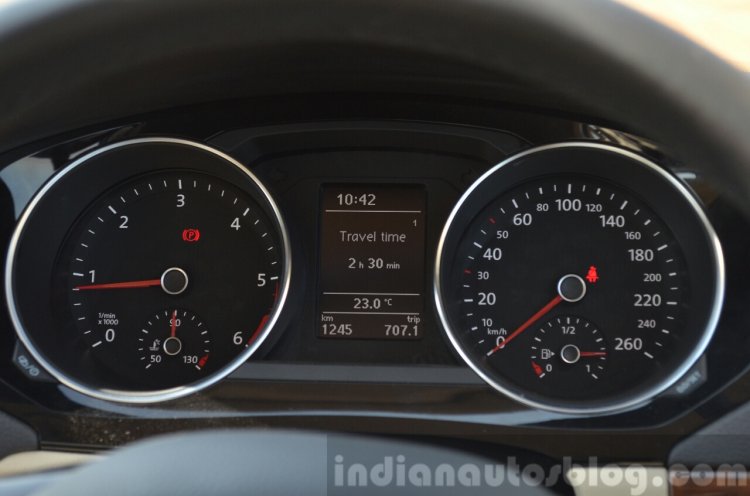
Having said that, there continues to be a few missing links on a car that costs as much as INR 20 lakhs. VW will still not provide a rear-view camera, and despite the top-end variant getting a touchscreen music system, a Navigation system is missed.
It is also strange to note that the base variants get a USB port, but the top-end Highline does without this feature; instead you get a Media-IN adapter cable in the glovebox, and you’ll have to purchase a compatible cable to plug in your USB drive.
Engine and Gearbox:
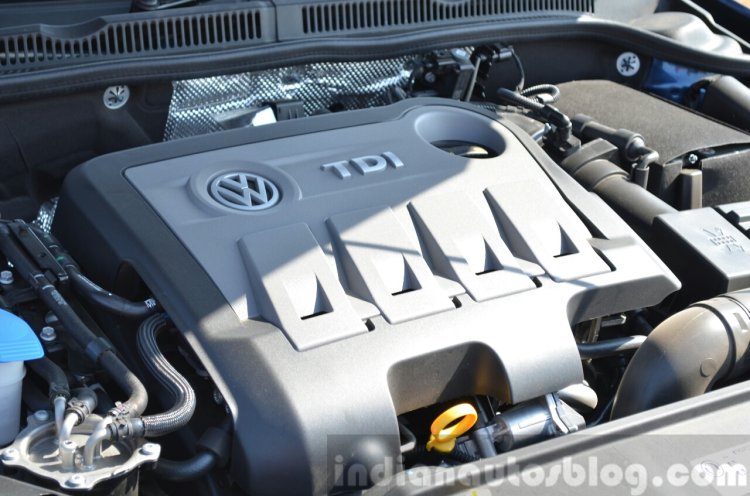
There are no changes to the mechanicals of the Jetta facelift. The volume-seller of the lot, the Jetta diesel, is powered by a 2.0-liter four-cylinder TDI engine capable of 140 PS and 320 Nm of torque. A choice of a 6-speed manual or a DSG automatic is offered.
This unit may not be the quietest motor, but its strengths are the low-end power and efficiency. The 320 Nm of torque is available between 1,750-2,500 rpm providing short bursts of quick acceleration.
That being said, the Jetta diesel now appears a touch underpowered (read Heavy) after sister brand Skoda launched the lighter MQB-based Octavia. The Skoda makes 3 PS more, and is 60 kg lighter, and feels more agile than the Jetta. Still, the 2.0-liter TDI Jetta has enough performance for city and highway duties, but we would like to see a bit more oomph from this unit.
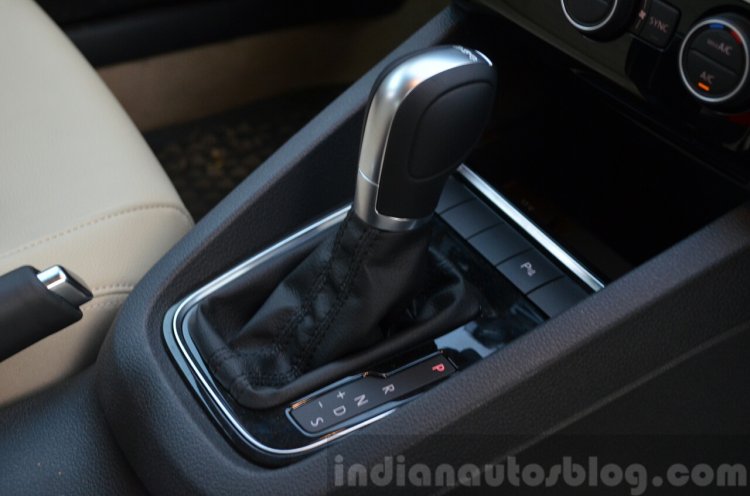
Drive the Jetta diesel DSG though, and you might not drive the manual variant. Despite being a 6-speed unit - even the cheaper Vento diesel DSG gets a 7-speed system - this gearbox’s super-smooth shift quality will leave you impressed.
And despite weighing 38 kg more than the diesel manual, the Jetta DSG feels a bit more effortless to drive as the engine is always in the sweet-spot, and when its not, downshifts are extremely quick. With automatic transmission cars gaining more acceptance in the Indian market, VW India would have done well to introduce the DSG even on base variants of the Jetta.
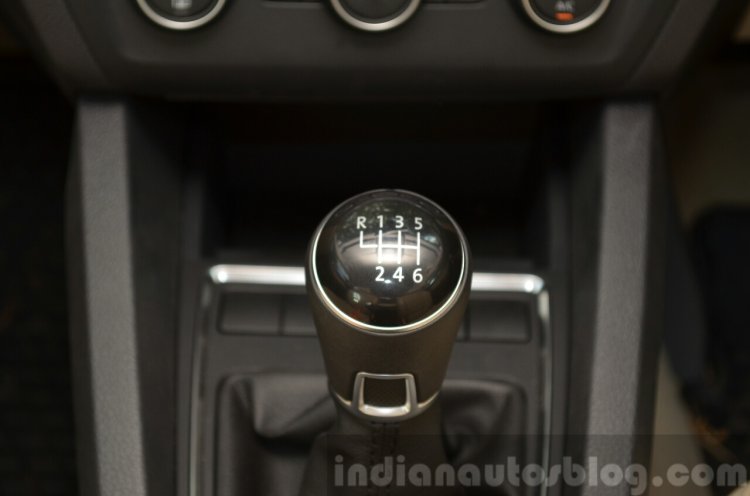
Also on offer is a 1.4-liter four-cylinder TSI engine capable of 122 PS and 200 Nm of torque. With superior NVH levels, we found this engine to be butter smooth even when revved to its limit.
In terms of low-and mid-range grunt, the Jetta TSI seems to be a capable performer, a driver's car if you will, thanks to the slick 6-speed manual and the responsive TSI unit. At higher revs (post 4,500 rpm), the 1.4-liter unit begins to loose breath, and beyond 5,000 rpm, there is really no point pushing it further.
Overall, the powertrain package of the Jetta, despite being capable units, does highlight the age of the 'PQ35' platform, which now seems a touch heavy compared to the modern MQB.
Ride and Handling:
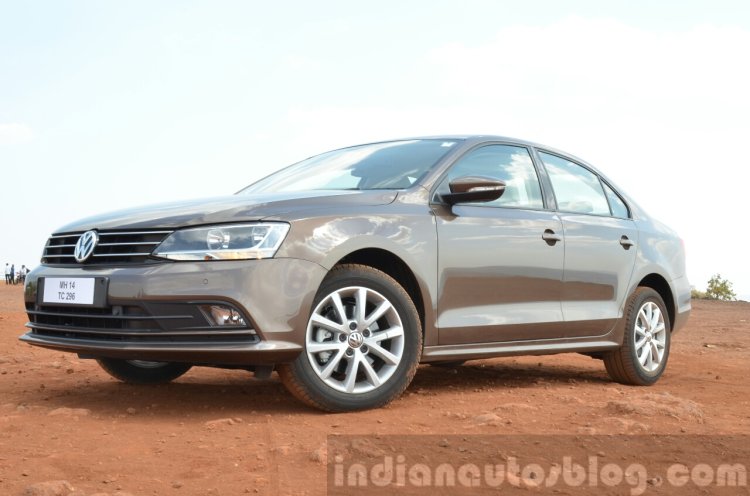
The ride and handling is one department where the old Jetta managed to triumph over its competitors. As there are no mechanical changes, the Jetta facelift rides, and handles exactly like its predecessor.
The ride is composed over most surfaces, and its only the odd crater which throws the suspension off-guard. The diesel' ride feels a bit more settled thanks to its extra 50 kg weight up front.
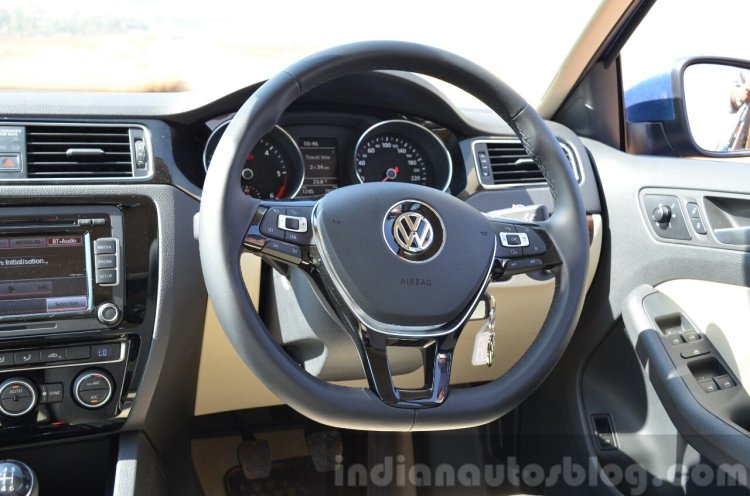
The same goes for the handling, where we felt the diesel Jetta with its slightly heavier nose manages to be a bit more confident than its petrol sibling. Irrespective of the fuel type, behind the wheel, the Jetta’s chassis feels extremely taut and well balanced; you don’t get the same feeling on the Elantra or the new Corolla.
We do have a minor grouse for the tyres, which we feel could do with more grip considering the well-balanced chassis and capable engines.
Brakes and Safety:
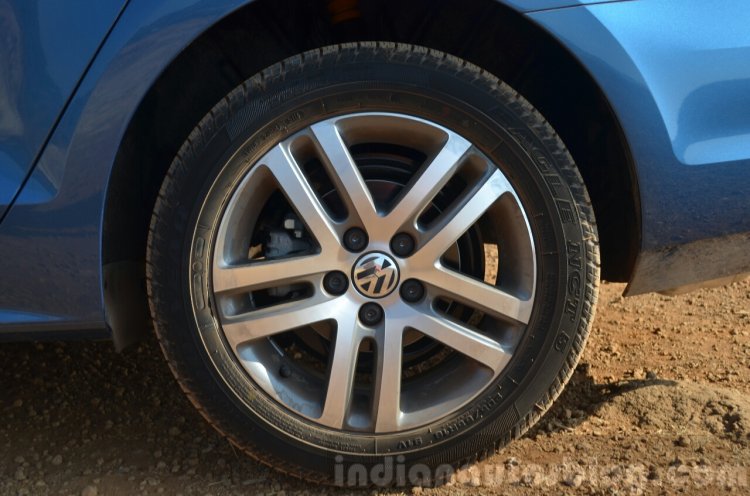
All variants of the Jetta facelift come with front and rear discs, ABS, EBD, ESP and 6-airbags, so the safety aspect is well covered.
The Jetta’s brakes are reassuring to use, and bring the sedan to a halt in a quick, yet, composed manner. Back in 2011 when it was crash tested by the Euro NCAP, the Jetta scored 5/5 stars. In terms of supplementary restraint systems, and preventive technologies, the Jetta (and Octavia) is one of the safest cars in this segment.
Fuel Efficiency:
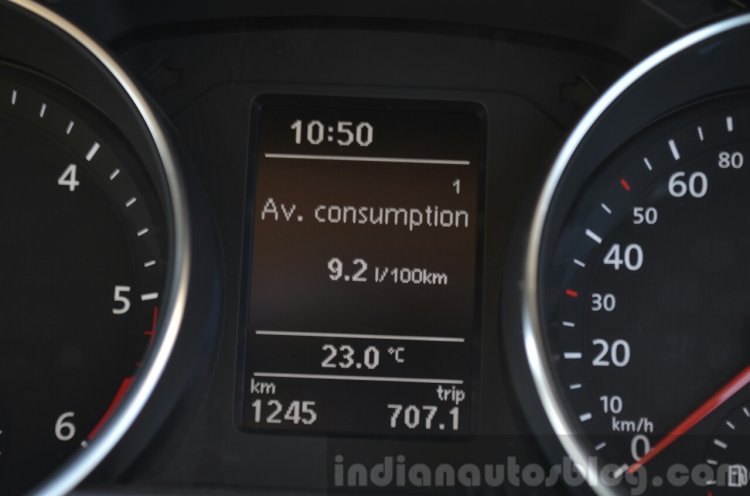
VW India claims the diesel Jetta will achieve 19.63 km/l (16.96 km/l for the DSG) and the petrol will do 14.69 km/l. In our drive, we found the diesel to average 11 km/l, with the DSG not too far behind at 10.52 km/l. The Jetta petrol though did not manage more than 7 km/l.
Prices:
The Jetta facelift petrol is priced from INR 13.87 lakhs to INR 15.36 lakhs, the diesel from INR 15.01 to INR 18.76 lakhs, and the DSG at INR 19.77 lakhs. All prices are ex-Showroom, Mumbai.
Verdict:
Overall, the 2015 Jetta comes across as an upgraded version of the executive sedan.
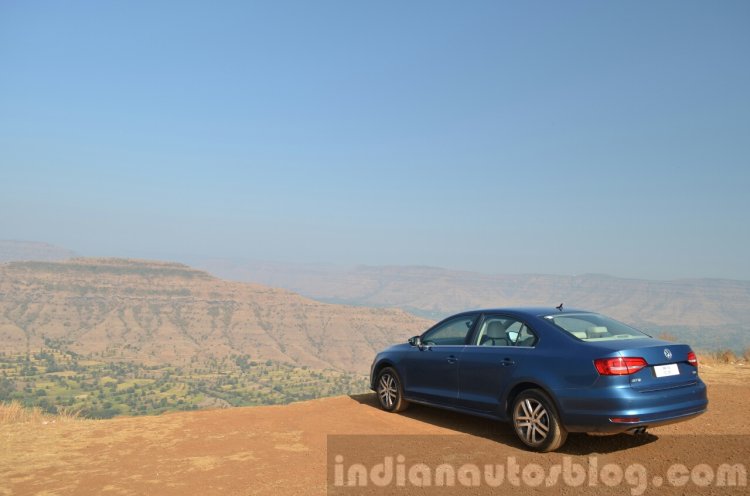
The exterior of the car, continues to have that understated feel, yet looks a touch more premium than the older model. Ditto for the interior with the new steering wheel, and inclusion of standard features like cruise control and dual-zone climate control.
The ride and handling was, and continues to be the Jetta’s trump card. But for once, the highlight of the Jetta seems to be the pricing. VW has adopted sensible, and dare we say, value-for-money pricing with the Jetta facelift. The base diesel variant is a whopping INR 3.31 lakhs cheaper than the Skoda Octavia 2.0 TDI Ambition, ex-Showroom, Mumbai. And while the Skoda may use a more modern MQB platform, it still does without 6 airbags and cruise control, features that are standard on the Jetta.
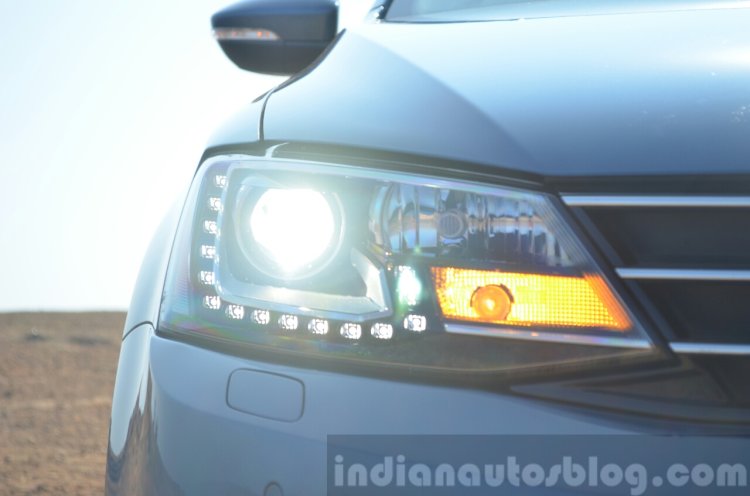
Even if you choose the petrol variant, the Jetta facelift is INR 90,000 more expensive than the new Corolla Altis, INR 2,000 more than the Elantra, and a significant INR 2.79 lakhs cheaper than the Octavia 1.4 TSI.
Choosing the Jetta facelift over the Korean and Japanese rival (the current best seller in the segment) also has a lot to do with the aftersales support each brand offers. VW India says they’re working on improving their post-sales support, which has established a reputation for being expensive.
While the Toyota Corolla will no doubt be cheaper to own, run and maintain, we would have to pick the Jetta for its Germanness, the characteristic of offering steadfast build quality, superior driving dynamics and capable engines.
